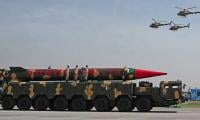Twenty years have passed since the 9/11 attacks, but its repercussions are still haunting the world, especially the people in South Asia, because they have been at the humiliating end of the security measures taken after the unfortunate incident.
Speakers predominantly from Pakistan, Afghanistan, India and Bangladesh converged in an online moot on Sunday to discuss the US campaign against terrorism affecting their lives and the societies they live in, and how they could collectively proceed towards creating a better world that is a safe place for everyone.
Radhika Coomaraswamy, chairperson of South Asians for Human Rights, said that 9/11 brought a stark shift in the conscience of the world, and provided an excuse to the US for cynical use of military operation in other parts of the world.
She said that other countries also followed suit, and eventually the “war on terror” became a tool for states to persecute minorities, as was in the case of the genocide of Muslims in Myanmar.
She added that draconian laws were passed across the world, states became national security states in which militaries were glorified institutions, and then eventually every problem started being handled with a military solution.
She said that the incident also led to the development of weapons of mass destruction, and that the drone was one of the most lethal among them. Rais Bhuiyan, originally hailing from Bangladesh, is a survivor of hate crime post-9/11. He said: “When the rescuers at Ground Zero were searching for survivors, I became a victim of a white supremacist, Mark Anthony Stroman, in Texas who pulled the trigger of a shotgun at me at point-blank range, spraying my face with pellet bullets, because he believed that the US was no place for Muslims.”
Bhuiyan, who is an IT professional and founder of the human rights advocacy group World Without Hate, added that despite suffering from this life-threatening attack, he was discharged from the hospital the very next day because he did not have medical insurance at that time, and he was asked to maintain follow-up check-ups on his own.
He said that from that day he realised that he had gotten a second life, and that he should serve it in ensuring that no one goes through an ordeal like his. Khushi Kabir, a social activist and environmentalist, said that the anti-terrorism laws promulgated after 9/11 took away the basic human and democratic rights of people across the globe, and induced the means for religious and racial bigotries. She added that the victims of these legislations were not only Muslims but also minorities everywhere.
She added that she found it worrying that 9/11 became an excuse for states to impose their control, and almost every one of them used these laws to curb free speech and human rights, hence stopping their people from having the kind of discourse that called for a sustainable peace and accountability.
Mejindarpal Kaur, international legal director for the civil rights NGO United Sikhs, said that instead of making oppressive laws, the world should identify what led to the absence of peace. She shed light on the importance of not having enemies as a measure of peace-building, and urged people, especially South Asians, to stop calling their neighbours enemies.
She drew a comparison between becoming fearless and having no enemy, commenting that South Asia can be a starting point for a global peace-building measure, because the region has a tradition of relying on the spirit to bring solutions to the fore.







